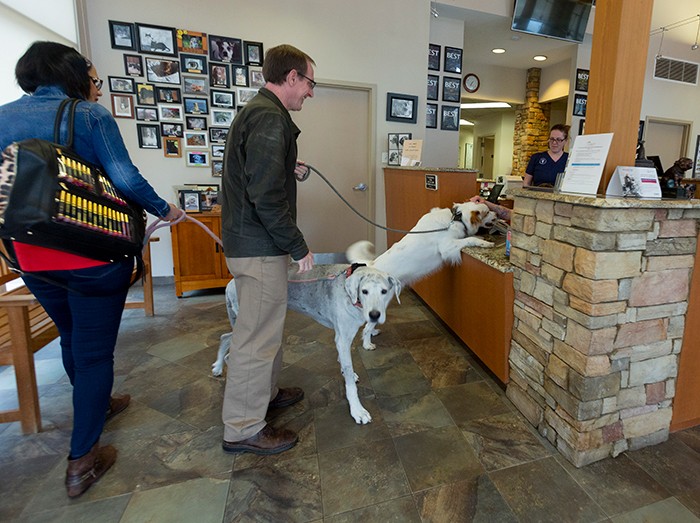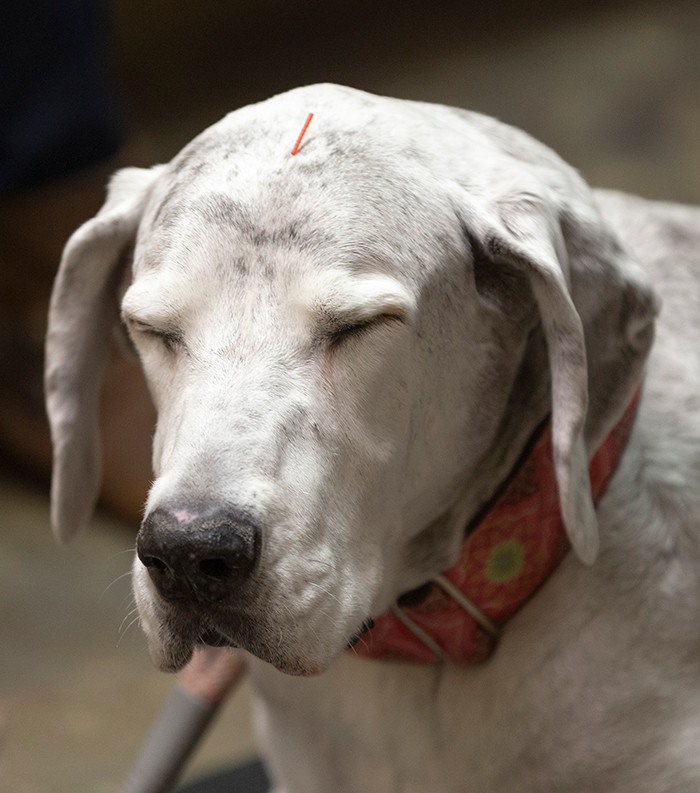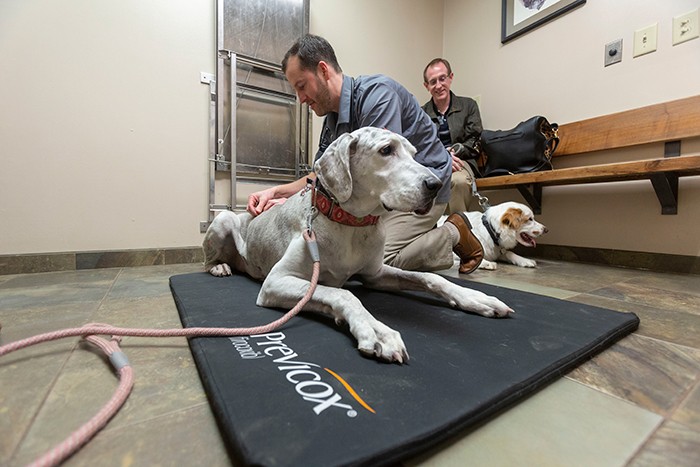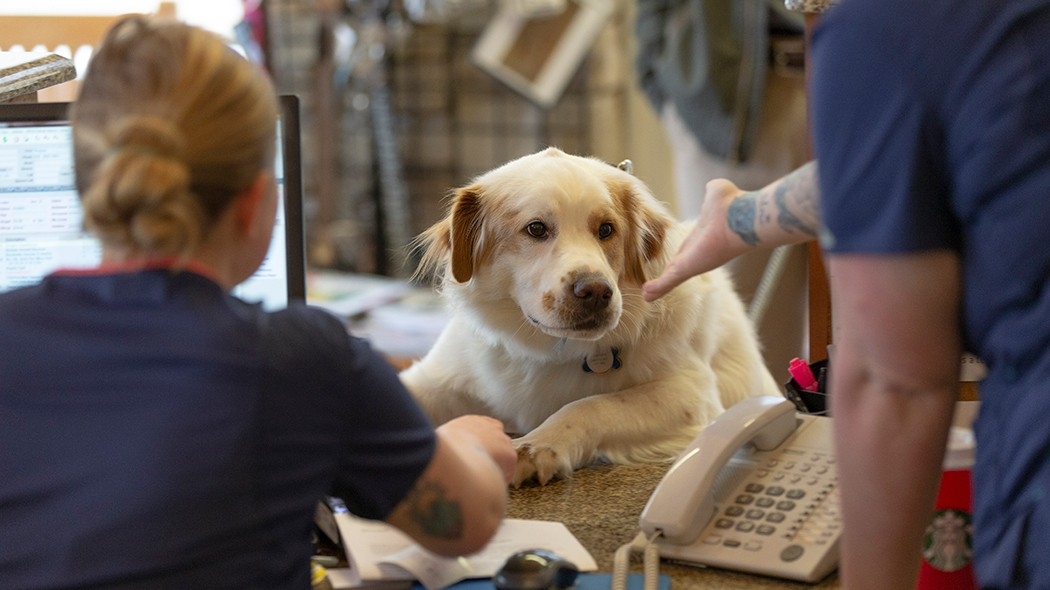After Fuquay-Varina residents Rosa and David Matusik lost their first dog to cancer, they opted for pet health insurance for their dogs to help cover future costs.
When a second dog of theirs was diagnosed with a mass cell tumor about a year-and-a-half ago, it required surgery and chemotherapy at N.C. State University’s veterinary hospital. The vet bills began to add up, and that insurance became worth every dime they had paid over the years. When it was all said and done, their dog’s cancer treatments totaled about $20,000.
Pet insurance through Trupanion – the company the Matusiks chose after doing some research – covered 90 percent of those bills, minus roughly $1,500 due to a deductible and exam fees that weren’t covered. Although their dog passed away, the Matusiks had the comfort of knowing they’d done everything they could for their much-loved pet.
“That whole experience, we would not have been able to treat her had we not had Trupanion,” Rosa Matusik said.

David and Rosa Matusik, arriving at Town & Country, have pet health insurance for their dogs Leeya, a 12-year-old Great Dane, and Sampson, a 2-year-old Great Pyrenees mix.
Advances in veterinary medicine now allow vets to do more for pets — treating conditions that were not treatable in the past and saving lives with measures against diseases like cancer, says Nick Ashford of Town and Country Animal Care Center in Apex.
“The technology and level of care is parallel to human level,” he said.
At the same time, Ashford says he finds that pets are like family to more and more pet owners, noting he sees it most in younger adults. They’re willing to go far to maintain their pets’ quality of life and to treat them if something unthinkable happens.
That’s where these pet policies come into play.
“If everybody had pet health insurance, it would make it easier for them to provide the best care for their pets,” Ashford said.

Leeya, the Great Dane, has health insurance to cover emergency vet visits. The Matusiks opted for additional coverage for homeopathic and natural treatments for their dogs. This policy helps pay for acupuncture to treat nerve degeneration in Leeya’s spine.
Increasingly popular option
Pet medical insurance has traditionally been more popular in Europe than in North America, with only one to two percent of U.S. households choosing to insure their pets. However, the market is growing, says T.J. Houk, chief member experience officer at Trupanion.
“We see continual growth in the market as responsible pet owners are finding value in the products now being offered,” Houk said.
The idea of pet health insurance is not new, Ashford says. However, companies in the past have hit bumps in the road. Some required the pet owner to file for reimbursement, meaning the owner would have to pay out of pocket and wait for the money to come in. Others would question every claim, sometimes requiring proof from the vet in the form of letters and medical records, making the process time consuming.
Today’s companies have streamlined the process. Trupanion, for example, allows the vet’s office to file claims online, so the owner’s only financial responsibility is the deductible and any services not covered by their policy. Ashford says he feels if there’s a question on whether something should be covered or not, the company tends to pay in favor of the pet owner.
Trupanion, one of the more popular pet insurance options, does not cover wellness visits and vaccines. According to the website, that’s a conscious choice. Pet owners can budget for those regular annual costs and don’t need to pay a middle man to cover those. Instead, pet owners can purchase pet health insurance for the unexpected.
The “unexpected” covers a wide range from injury to illness, Houk says. As the Matusiks found when a claim needs to be filed, it covers the bills nearly in-full – 90 percent coverage with no payout limit.
“This includes those most likely to happen, such as congenital or hereditary conditions common in certain breeds,” he said.

Dr. Matthew Merriman inserts tiny needles along Leeya’s spine during an acupuncture treatment at Town & Country Veterinary Hospital.
Hereditary conditions include hip dysplasia, diabetes and much more, while congenital conditions can range from heart or liver disease to cataracts. And, as many pet owners can find themselves dealing with the unknown – perhaps their pet is regularly vomiting or having diarrhea,, and they need a diagnosis – Trupanion pet health insurance can also be used in those cases as well. The company covers the diagnostic tests, surgeries, hospital stays and medications that can be necessary to identify and treat these illnesses and diseases.
Before making a decision on pet insurance, consumers should compare coverage, benefit limits, pricing, deductibles and reimbursements.
- Trupanion, trupanion.com
- Healthy Paws Insurance, healthypawspetinsurance.com
- Figo Pet Insurance, figopetinsurance.com
- Embrace Pet Insurance, embracepetinsurance.com
- Nationwide Pet Insurance, petinsurance.com
- Pets Best Pet Insurance, petsbest.com
- Petplan Pet Insurance, gopetplan.com
- PetFirst Pet Insurance, petfirst.com
Sources: New York Times, caninejournal.com, consumersadvocate.org
Insure early if possible
The trick is to insure pets at an early age whenever possible, Houk says. Most insurance companies do not cover pre-existing conditions, so enrolling a healthy puppy or kitten will ensure the most coverage over their lifetime. Pets can be enrolled as soon as they are born, but if pet owners don’t think about it until later in a pet’s life, Trupanion will enroll pets up to 14 years old.
Pet owners can also choose a deductible level – a higher deductible means more out of pocket, but a lower monthly payment plan for the premium. A lower deductible means less out of pocket, but a higher monthly premium payment.
While some pet owners may argue that their pet is healthy,, and they don’t need insurance, Houk notes that it’s impossible to know what the future holds.
“Having coverage gives pet owners the peace of mind that if their pet is unlucky, they can simply focus on providing their pet with the best medical care, no matter what it takes,” he said. “Bottom line, medical insurance is just as worthwhile for healthy pets as it is for pets who require frequent care.”
Prepare for unexpected
The Matusiks, currently owners of two dogs, agree.
“I personally think it’s worth it to get insurance,” Rosa Matusik said. “You just never know – all it takes is one hospitalization.”
Recently, their Great Dane had an ulcer caused by a medication she was taking, and ended up at an emergency vet clinic where she needed blood transfusions and multiple tests. Their insurance coverage kicked in again.
The couple also has optional coverage for natural and homeopathic treatments, and their Great Dane recently began receiving acupuncture to treat nerve degeneration in her spine.
Ashford supports pet health insurance for these and many other types of unexpected events that will come up in the lives of pets. As people consider their options, he says, they should think about the parallels to their own lives.
“Some people can relate from their own health experiences, where they’ve had something happen that health insurance has covered that would have devastated them if they didn’t have health insurance,” Ashford said. “We’re as devoted to our pets as we are to our other family members. When they’re in a situation like that without pet health insurance, it can be financially devastating.”
- Small but Mighty
- The Company Women
- Don’t Call it Networking
- Nonprofit Spotlight: Polka Dot Mama Melanoma Foundation
- Pet Parade
- Buying Peace of Mind
- Small Business Spotlight: Pupsi
- Restaurant Profile: G.58 Cuisine
- Liquid Assets: Bourbon Whiskey by Old Nick Williams Co.
- Liquid Assets: Conviction Bourbon
- Liquid Assets: Broadcloth Pilsner
- Carolina Reaper: Hottest of the Hot
- From the Editor: May 2019






